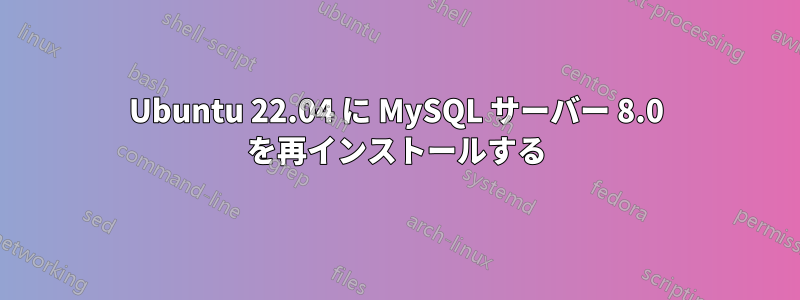
次のコマンドを使用して MYSQL のインストールを削除する必要がありました。
sudo apt remove --purge mysql-server
sudo apt purge mysql-server
sudo apt autoremove
sudo apt autoclean
sudo apt remove dbconfig-mysql
すべて正常にパージされたようです。
再インストールしようとすると、更新ファイルの一覧の後に次のエラーが表示されます。
Setting up mysql-server-8.0 (8.0.30-0ubuntu0.22.04.1) ...
Renaming removed key_buffer and myisam-recover options (if present)
ERROR: Unable to start MySQL server:
mysqld: Can't read dir of '/etc/mysql/conf.d/' (OS errno 2 - No such file or directory)
mysqld: [ERROR] Stopped processing the 'includedir' directive in file /etc/mysql/my.cnf at l
ine 20.
mysqld: [ERROR] Fatal error in defaults handling. Program aborted!
Please take a look at https://wiki.debian.org/Teams/MySQL/FAQ for tips on fixing common upgr
ade issues.
Once the problem is resolved, run apt-get --fix-broken install to retry.
dpkg: error processing package mysql-server-8.0 (--configure):
installed mysql-server-8.0 package post-installation script subprocess returned error exit
status 1
dpkg: dependency problems prevent configuration of mysql-server:
mysql-server depends on mysql-server-8.0; however:
Package mysql-server-8.0 is not configured yet.
dpkg: error processing package mysql-server (--configure):
dependency problems - leaving unconfigured
No apport report written because the error message indicates its a followup error from a pre
vious failure.
Errors were encountered while processing:
mysql-server-8.0
mysql-server
E: Sub-process /usr/bin/dpkg returned an error code (1)
ウィキリンクを確認しましたが、役に立ちませんでした。3年前に同様の投稿をここで見ましたが、推奨されているように「apt install -f」を試しましたが、やはり役に立ちませんでした。
答え1
mysql を削除する前に、 を使用してオフになっていることを確認してからsudo systemctl stop mysql、コマンドを再度発行してください。
MySQL サービスを停止した後、実行してsystemctl status mysqlオフになっていることを確認できます。
うまくいったかどうか教えてください。
[その他の解決策]
エラー メッセージからディレクトリを作成します。
sudo mkdir -p /etc/mysql/conf.d/
新しいmysql.cnfファイルを作成し、[mysql]そこに書き込みます。
echo "[mysql]" | sudo tee /etc/mysql/conf.d/mysql.cnf
パッケージを再構成します。
sudo dpkg --configure -a


